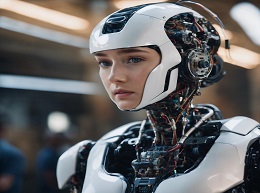Exploring AI in Robotics: Recent Breakthroughs

Artificial Intelligence (AI) is revolutionizing the field of robotics, enabling machines to perform complex tasks autonomously and adapt to dynamic environments. Recent breakthroughs in AI have unlocked new possibilities for robotic systems, transforming industries and reshaping our interactions with technology. In this article, we explore the latest advancements in AI applied to robotics, uncovering groundbreaking innovations and real-world applications.
1. Enhancing Autonomy with AI:
AI-powered robotics are achieving unprecedented levels of autonomy, enabling machines to make decisions, learn from experience, and navigate unstructured environments independently. From self-driving cars to autonomous drones, AI is revolutionizing transportation, logistics, and beyond.
Example: Boston Dynamics' Spot robot utilizes AI algorithms to navigate challenging terrains, avoid obstacles, and perform tasks in dynamic environments, showcasing the potential of AI in enhancing robotic autonomy.
2. Machine Learning for Adaptive Behavior:
Machine learning algorithms are enabling robots to exhibit adaptive behavior, learning from interactions with their surroundings and adapting their actions accordingly. This capability allows robots to optimize performance, improve efficiency, and accomplish tasks with greater precision.
Example: The Roomba robotic vacuum cleaner uses machine learning algorithms to adapt its cleaning patterns based on the layout of the room and the presence of obstacles, providing efficient and thorough cleaning performance.
3. Natural Language Processing in Human-Robot Interaction:
Advancements in natural language processing (NLP) are enabling robots to understand and respond to human commands and queries more effectively. This capability enhances human-robot interaction, making robots more intuitive and user-friendly in various settings.
Example: Amazon's Alexa-powered robotic assistant, Astro, utilizes NLP algorithms to understand voice commands and perform tasks such as controlling smart home devices, providing weather updates, and answering questions, enhancing its usability and functionality.
4. Collaborative Robotics:
Collaborative robots, or cobots, are designed to work alongside humans in shared workspaces, enhancing productivity and safety. AI plays a crucial role in enabling cobots to collaborate effectively with humans, ensuring seamless interaction and coordination in collaborative tasks.
Example: Universal Robots' UR5e cobot utilizes AI algorithms to detect and adapt to changes in its environment, allowing it to collaborate safely with human workers in manufacturing and assembly tasks, improving efficiency and workplace safety.
5. AI-Powered Surgical Robotics:
AI is revolutionizing the field of surgery through the development of AI-powered surgical robots. These robots assist surgeons in performing minimally invasive procedures with greater precision and accuracy, reducing risks and improving patient outcomes.
Example: The da Vinci Surgical System, equipped with AI-powered algorithms, enables surgeons to perform complex surgical procedures with enhanced precision and control, minimizing incisions and reducing recovery times for patients.
6. Overcoming Challenges:
While AI-powered robotics offer tremendous potential, they also pose challenges related to safety, ethics, and societal impact. Addressing these challenges requires careful consideration of ethical principles, regulatory frameworks, and collaborative efforts across industries and stakeholders.
Example: The development of autonomous vehicles raises ethical dilemmas related to decision-making in critical situations, highlighting the importance of ethical guidelines and regulations to ensure the safety and ethical use of AI-powered robotics.
Artificial Intelligence (AI) is driving unprecedented advancements in robotics, unlocking new capabilities and transforming industries across the globe. From autonomous vehicles to surgical robots, AI-powered robotics are reshaping our world and revolutionizing the way we work, live, and interact with technology. As AI continues to evolve, the future of robotics holds limitless possibilities, promising to enhance efficiency, safety, and quality of life for individuals and society as a whole.
By exploring the latest breakthroughs in AI applied to robotics and examining real-world examples, we gain insights into the transformative potential of AI-powered robotics and its impact on various industries and domains. As AI continues to advance, the integration of AI and robotics will redefine the boundaries of what is possible, ushering in a new era of innovation and progress in the field of robotics.